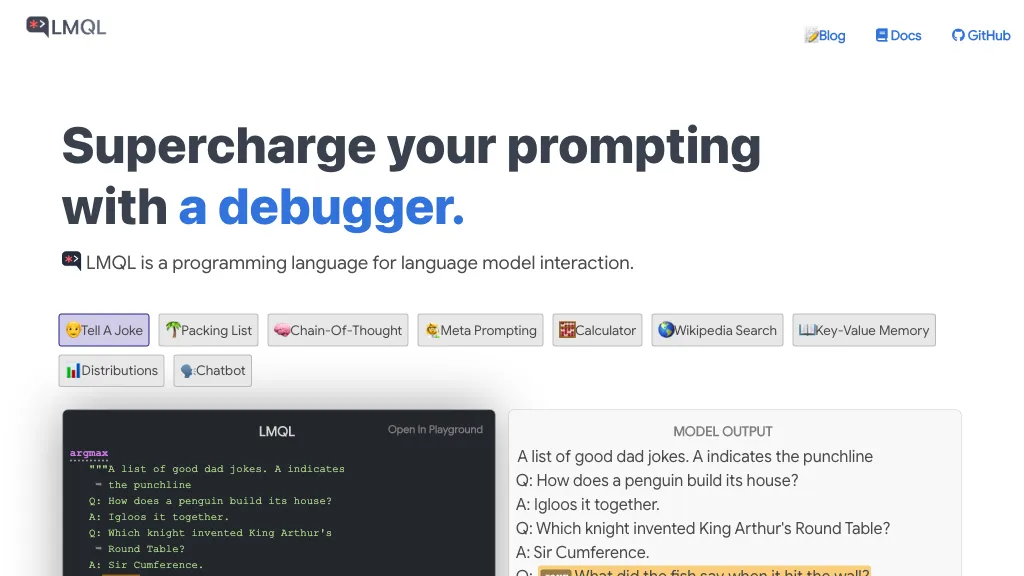What is LMQL?
LMQL is a powerful, language programming standard designed specifically for LLMs. It offers an effective interaction with models via modular prompting based on types, templates, and constraints, with an optimizing runtime. It assists the user in addressing a wide array of tasks, from simple queries to complex, procedural programming tasks. Moreover, this is supported by nested queries, making it perfect for modularized local instructions. This enhances reusability in components of prompts and also enhances procedural programming within the environment of prompt.
On the other hand, LMQL is designed to be for portability. This provides seamless switching between various back-ends with a single line of code. Prompt Construction and Generation LMQL evaluates expressive Python control flow and string interpolation which makes it to be a flexible and powerful tool to interact with LLMs.
LMQL—Key Features & Benefits
LMQL offers a range of varied features and advantages that best suit many classes of users. These include:
- Training a language model and its optimization,
- Generation of coherent and contextually appropriate text,
- Fine-tuning language models on target tasks,
- Model evaluation and analysis to improve performance,
- Model deployment, and integration into applications.
One of the unique selling points of LMQL is that it supports multiple languages; it is quite compatible with language models like GPT-3 and GPT-4. In effect, this elasticity can be used to drive a model as per the requirements of the developer. Apart from this, optimization techniques inside LMQL increase query performance and reduce latency to ensure interaction with language models effectively.
Use Cases and Applications of LMQL
LMQL is a very versatile tool with applicability in many areas:
- Generation of prompts to LLMs with types, templates, and constraints for a raft of tasks;
- Implementing procedural programming tasks by looking into the modularized set of local instructions in LMQL;
- Ensuring seamless portability across different backends and platforms for LLM interaction.
Fields such as AI development, Data Science, and Machine Learning can essentially make good use of LMQL. This is quite useful for the workflow of ML engineers, Data Scientists, AI Developers, and Researchers, as it arms them with a great tool to improve their workflow and upgrade projects.
How to Use LMQL
Using LMQL boils down to a few steps:
- Install the package from the official repository.
- Learn the syntax in the provided documentation and tutorials.
- Write queries to talk to language models with the power of modular prompting from LMQL.
- Optimize and finetune the models for your needs.
- Integrate the models effortlessly in your applications.
To use the best practices, make sure that you utilize all the exhaustive examples and community support. The user interface for LMQL has been designed to make its set of features very intuitive to navigate and use correctly for both old programmers and new ones.
How LMQL Works
LMQL runs above a solid technical framework that makes it work:
The language uses expressive Python control flow and string interpolation to construct and generate prompts. This aids users in making dynamic and contextually appropriate prompts with much ease. Besides, handling of nested queries by LMQL facilitates the construction of modularized local instructions, which are reusable across different tasks, hence smoothening the interaction process with LLMs.
It, in general, supports multiple backends that allow users of the interface to be able to switch between these seamlessly. At the center of this is an optimizing runtime that makes sure query performance is efficient and reduces latency to provide a smooth and effective interaction with the language models.
Pros and Cons of LMQL
Like any tool, LMQL has certain advantages and probable defects:
-
Pros:
high flexibility and power in interaction with LLMs; several LLMs are supported; it offers a wide range of optimization techniques; provides a fully functional ecosystem with rich documentation and community support. -
Cons:
these prospective advantages for a beginner to work with natural language may be too highly priced; deep knowledge of LLMs is needed to apply some advanced features.
User feedback has mostly been positive, touting LMQL as game-changing for workflows and in creating interactive AI solutions.
Conclusion about LMQL
It is, in other words, a powerful, flexible, specially designed, high-level programming language in its own right for interacting with Large Language Models. Considering its voluminous features and advantages, the language is a very good choice for any developer, researcher, or data scientist who wants to get full value from LLMs. Seamless portability, optimization techniques, and a comprehensive ecosystem enhance its appeal and make it a valuable addition to any AI development toolkit.
As LMQL continues to evolve, future developments and updates promise to support its uses in providing increasingly meaningful tools for the development of AI.
Frequently Asked Questions: LMQL
What is LMQL?
LMQL represents a programming language developed especially for effective interaction with Large Language Models to function with modular prompting capabilities and seamless backend portability.
Who are benefited by using LMQL?
It can help ML engineers, data scientists, AI developers, and researchers significantly by using LMQL.
How does LMQL ensure efficient query performance?
LMQL provides efficiency in query performance by means of optimization techniques and an optimizing runtime for minimizing latency.
What are the pricing options for LMQL?
LMQL has a freemium model where all of its core capabilities are free, with advanced features available on paid subscription plans.










